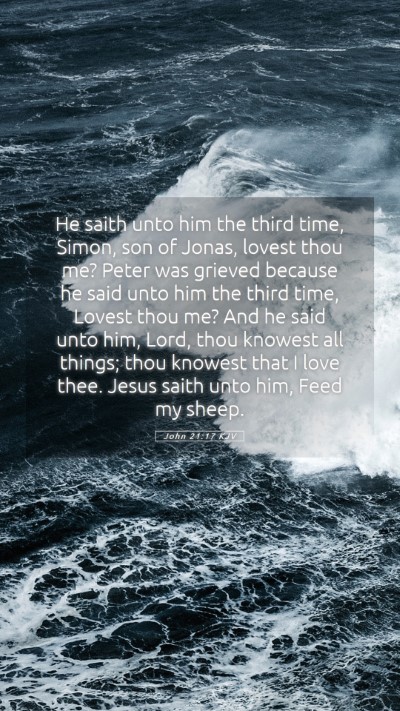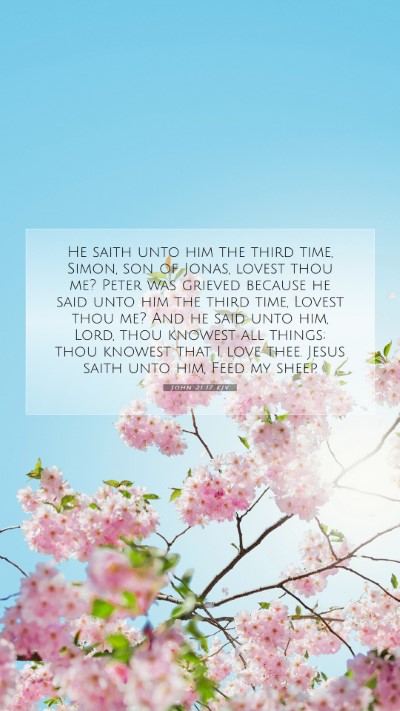Old Testament
Genesis Exodus Leviticus Numbers Deuteronomy Joshua Judges Ruth 1 Samuel 2 Samuel 1 Kings 2 Kings 1 Chronicles 2 Chronicles Ezra Nehemiah Esther Job Psalms Proverbs Ecclesiastes Song of Solomon Isaiah Jeremiah Lamentations Ezekiel Daniel Hosea Joel Amos Obadiah Jonah Micah Nahum Habakkuk Zephaniah Haggai Zechariah MalachiJohn 21:17 Meaning
What is the meaning of John 21:17?
He saith unto him the third time, Simon, son of Jonas, lovest thou me? Peter was grieved because he said unto him the third time, Lovest thou me? And he said unto him, Lord, thou knowest all things; thou knowest that I love thee. Jesus saith unto him, Feed my sheep.
John 21:17 Bible Verse Meaning
Understanding John 21:17
John 21:17 states, "He said to him the third time, 'Simon, son of Jonah, do you love me?' Peter was grieved because he said to him the third time, 'Do you love me?' And he said to him, 'Lord, you know all things; you know that I love you.' Jesus said to him, 'Feed my sheep.'
Meaning and Interpretation
This passage occurs after the resurrection of Jesus, where He reinstates Peter after his denial. The questioning of Peter three times parallels Peter's three denials of Christ, emphasizing the restoration of Peter as a leader among the apostles.
Key Points from Public Domain Commentaries
-
Matthew Henry:
Henry reflects on the deep emotional aspect of Peter’s response, noting that Jesus’s questioning serves both as a challenge and a comfort. It is an acknowledgment of Peter’s earlier failures but also a recommissioning to a vital role in the Church.
-
Albert Barnes:
Barnes emphasizes that Jesus’s command "Feed my sheep" signifies the pastoral responsibility given to Peter. This implies nurturing the faith of new believers and leading them. It highlights love as foundational to service in Christ's name.
-
Adam Clarke:
Clarke mentions that it is not enough to love Jesus in sentiment; one must also demonstrate this love by caring for others. This verse drives home the point that true love for Christ translates into active ministry.
In-Depth Bible Verse Analysis
This verse serves as a critical teaching moment where Jesus not only forgives Peter but also sets him on a path to leadership within the early Church. The recurring question of love indicates the importance of love in the Christian faith—it's not merely an emotion but a call to action.
Historical Context
In the cultural and historical context of the time, shepherding (or feeding sheep) was a common metaphor for leadership. Jesus often used agrarian metaphors to convey His messages, making them accessible to His audience.
Application in Daily Life
In today’s context, this verse challenges believers to reflect on their love for Christ and how it manifests in their lives. It poses the question: "How do I serve others as an expression of my love for Jesus?"
Significance and Importance
John 21:17 illustrates a pivotal moment of grace and restoration. It reaffirms that regardless of past failures, individuals can still be entrusted with God’s mission and responsibilities.
Broader Themes
This passage encompasses themes of forgiveness, restoration, and the vital link between love for Christ and service. Such deep theological principles are foundational to understanding the Christian faith.
Related Bible Verses
- Matthew 16:18: Jesus declares Peter as the rock on which He will build His church.
- 1 Peter 5:2: Peter himself encourages church leaders to shepherd God's flock.
- John 10:16: Jesus speaks of His sheep and the importance of embracing all who hear His voice.
These cross-references further illuminate the duties and privileges associated with leadership in the faith community.
Conclusion
In summary, John 21:17 remains a profound indicator of what it means to love Jesus and the significance of that love in action. This verse stands as a motivational piece of scripture for study groups and individual believers seeking to deepen their understanding of biblical leadership and the Christian call to service.


